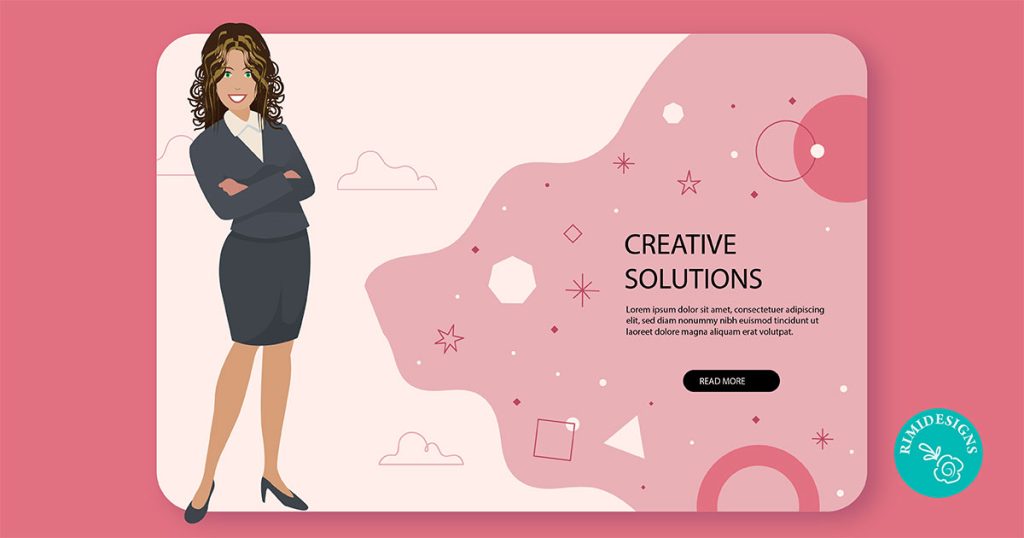
8 Tips to Start Your Own Web Design Agency
Have you always wanted to be your own boss? When working as a web designer or developer, having an own agency or working as a freelancer can be very tempting. But it’s not an easy challenge, as you need to have a lot of abilities to be successful in the tough market.
The accounting needs to be taken care of and marketing needs to be done to help you become famous and get commissions. You’ll also need a sufficient seed capital so that you can not only start but also survive droughts.
Here are 8 useful tips to start your own web design agency.
1. Adjust your way of thinking
Being your own boss is very tempting but this is exactly what makes it difficult. A staff web designer will spend the majority of their working time actually designing. Other people work on gaining new commissions, doing the accounting and setting new goals and strategies for the business.
When you are your own boss and work for yourself only, you will need to work on new tasks. Even when you earn enough money to afford employees, you’ll still need to do more tasks not directly related to the core of the design business.
The more successful a business becomes, the less you will deal with web designing. You’ll turn into a full-time manager. But at least, you’ll still be your own boss and working as this boss is also rather exciting.
2. Find the right niche for your business
The most important decision is what group of clients you want to target with your web design. As you probably know, there are many customers serving the “I can’t spend anything” sector. But there are also the individual, more expensive and lovingly designed websites for those customers that are willing to pay for it.
Businesses gain public reputation rather quickly, either being known as a cheap supplier or as the creator of high-quality results. This should reflect your portfolio. Of course, it is completely okay to offer an additional, less expensive product. But the majority of your work should reflect the area you want yourself to be in.
3. Know what you’re offering
Web design is a relatively well-covered area, a nearly filled market. That’s why it’s important to ask yourself what makes you different from thousands of other web design companies nourishing from the same market.
Here, the challenge is to find the right niche, meaning the area that is not overcrowded by a lot of other market participants. Maybe you’ll focus on lawyers and their individual needs? Or you offer your service to doctors. Of course, you can try to cover the local market.
Quality can also be a characteristic to make you stand out. But to do that, you’ll need to be able to provide first-class and high-quality work.
When you’re a career changer in web design, it can be a good idea to focus on a niche that you used to work in before. Try to stand out from other agencies by offering added value. This could include many things, among them things that you don’t instantly recognise as added value but might be crucial to the customer.
For example, always keep your promises and be as fast as possible. When you assure your customer a cost estimate until 6 pm on the same day, keep your word and deliver it in time. Set reasonable times for project tasks and add a little more time to that so you never need to say sorry for delayed delivery. Your word is everything in today’s economy. So always keep your promises.
Create a network of partners that can do additional work. That allows you to offer bigger commissions or complete solutions.
A branding with a proper name and an appealing corporate identity should also be given. The name of your agency will ideally stick in one’s mind very quickly. Your logo should have a very high recall value.
4. Calculate the financial pressure properly
This is the most important thing when going freelance. As an employee, you’ll get paid on a specified date, every week and don’t need to worry about that. As a freelancer, this is entirely different.
Can you afford independence? To answer this question, you should thoroughly build up a sheet and throw those numbers in. Will you have customers with commissions already when starting your independent work? That’s an important factor. Otherwise, start-up costs will need to be calculated.
You’ll also need to calculate the regular running costs, as well as reserves for tough times in a commission drought. Also, make realistic estimates on how many new customers you can gain and how much you will earn from them. Set these estimates rather low. Optimism is nice but pessimism is required when it comes to money.
Calculate exactly when you’ll meet breakeven, meaning the point at which you earn enough money to cover your costs. When you just started working, you should know beforehand that it can take a long time until you’ll make profit. That’s why you need to know when breakeven, all costs covered, is reached. Starting from there, you calculate when you are able to start living from your work.
Also, think about whether you want to charge a fixed price or an hourly wage for your work. In both cases, you will need to calculate a realistic hourly fee. You’ll need to be very honest and include a time cushion when calculating with fixed price offers.
5. Become the perfect communicator
When you’re a brilliant web designer, that doesn’t mean you’re brilliant businessman and able to lead a design agency. That takes a lot more skill than just creating good websites.
We’ve already talked about the financial aspect. Now, let’s talk about one of the most remarkable abilities of an entrepreneur: communication.
You need to learn to be a fantastic communicator. Creative people often hide in their agencies and only work on their core tasks with passion. But in the economy, there are other things that count.
Almost every business-related problem can be solved through simple communication. Will your project be delayed? Get your telephone and talk about it with your customer. Do you need new commissions? Get your telephone, call potential clients and sell your services. Everything goes as planned? Inform your client. Maybe you already have first results. Your customer will be more than pleased to receive a link from you.
It’s understandable if you’re more of an introvert and have problems with cold calls or delivering sales presentations. But you can practice these critical skills. The more often you deal with it, the easier it will be for you. Consider the following: the more often you do those things you don’t like, the more money you’ll probably earn.
6. Get help and build new partnerships
When you’re not among the lucky ones that have a lot of money in their bank account, you probably won’t be able to afford employees from the beginning. This is not a problem, as you should look out for other people with skills that complement yours anyway. Start partnerships with these people.
Of course, you could also outsource subtasks by searching for proper persons on order portals. Then distribute these subtasks to these companies and freelancers.
Everyone has started small once and it’s not a problem to admit that you can’t do everything. Especially when starting a freelance business, this feels overwhelming. Don’t let it bring you down.
In the beginning, searching for people with complementing abilities to form partnerships has the highest priority. Then, you accept bigger projects and just outsource the tasks you can’t do. Once your business starts growing, employ workers for just these areas.
7. Always continue to work on your projects
It’s very tempting to let some projects slide during the startup phase of a business. Of course, taking care of your own blog for your small agency consumes a lot of time. You might be tempted to spend that time better. But that’s exactly what you shouldn’t do. The company’s blog is a valuable tool for branding and the generation of commissions.
Never underestimate the power of personal projects. Your brand popularity will thank you later. Just note what you spend your time with on work days for a week. You’ll often find time bandits that you need to optimise.
Freelancers also only have 24 hours a day. This time needs to be used the best way possible. Remove the time eaters and replace them with work on your own projects.
Always keep your web design knowledge up to date and write about it. This helps with growing popularity and convincing potential clients.
8. Start as a side job or jump in at the deep end
Once you’ve considered and worked through all these aspects, you’re prepared for independence. But not everyone dares to make the jump at the deep end of full-time freelancing. The question about money and the amount of customers, which you had from the beginning, remains.
When you’re lucky to have many customers “threatening” you with commissions, you can instantly go full-time freelance. Then the amount of invested money in the startup phase is relatively small.
When enough capital is available, you can also make the jump. However, when money and clients are limited, you should aim for a side business. However, a freelance business next to a full-time job put you under a lot of pressure. You shouldn’t take that lightly. But if you are well organised, you can deal with this double burden. This has the advantage that you don’t need to make the jump into the economy’s shark tank and allows you to slowly create your place in the web design industry.
Conclusion
Being self-employed as your own boss has many advantages. But to enjoy that, you need to know that it won’t be easy. You’ll need to work more and harder, thus you’ll have less free time.
Especially the beginning will be tough, as you’ll struggle. But when you realise that freelance work is your thing, every offer of a full-time job won’t matter anymore. You’ll never ever want to return to carpet land.
SOURCE: Noupe



